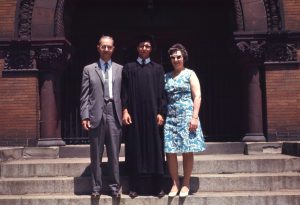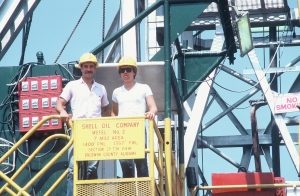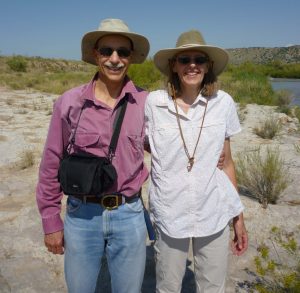Charles Bartberger – 1967
I’m grateful for the quality education I received at Lafayette College that launched me into a fun, rewarding geological career. As you’ll see, I entered the field of geology at Lafayette College and also my 38-year career as a petroleum geologist through ‘back doors’.

LAFAYETTE COLLEGE: In high school, I enjoyed math and science, and enrolled at Lafayette College as a math major. Although I was enjoying Calculus and was earning good grades, by the midpoint of spring semester sophomore year, I had the uneasy feeling that I was relying too much on memorization and was lacking the intuitive understanding and ability to reason through complex mathematical problems that I could see with both my father and fellow math students. I questioned my ability to excel in a mathematical career like that of my father, who pioneered much of the U.S. Navy’s understanding of the propagation of underwater sound for detection of enemy submarines. I knew I had to find a career that was as enjoyable for me as the physics of underwater sound was for my father. So one March afternoon of my sophomore year, I took a long soul-searching walk around campus and thought about what I had enjoyed most in my life. What struck me was the spectacular scenery in many national parks and monuments I had visited with my parents and sister, especially those in western USA. My father must have been a ‘closet geologist’ because every summer we drove across the USA to hike in as many national parks and monuments as we could cram into his 4 weeks of vacation. By the time I graduated from high school, I had been in all 48 states and most of the Canadian provinces, exploring natural wonders of the USA and Canada. I especially enjoyed conducted hikes and evening campfire programs with Ranger-Naturalists explaining geological processes that resulted in the spectacular scenery we observed. Never having taken a course in geology, I walked into Van Wickle Hall that March afternoon, and after two fun hours with Professor Arthur Montgomery, I walked out a geology major! With introductory physics and chemistry under my belt during freshman and sophomore years, respectively, I crammed all my geology courses into my junior and senior years at Lafayette. While at Lafayette, I ran freshman cross country, was a participating member in what was the social dormitory of Soles Hall, served as a resident advisor in freshman dorms for three years, and frolicked beside the football field as Lafayette’s leopard mascot my senior year.
POST-LAFAYETTE EDUCATION: After graduating from Lafayette, I attended the 6-week summer Y-BRA Geology Field Camp in Red Lodge, Montana, and returned to Van Wickle Hall in the fall to recount my field-camp experience to Lafayette students and faculty. Then I was off to Syracuse University to earn MS and PhD degrees in Geology, supervised by a very talented and stimulating professor, Dr. Bryce Hand. I spent my first summer as a grad student as a field assistant for a USGS geologist mapping bedrock geology in Isle Royale National Park, Michigan. My MS thesis evaluated sediment sources and sedimentation rates for Chincoteague Bay at Assateague Island National Seashore (Jour. Sed. Pet., 1976). My PhD research was a laboratory study using a 30-foot recirculating flume to investigate conditions under which slipface bedforms (ripples and dunes) are stable versus conditions resulting in flat beds (Jour. Sed. Pet., 1988).

PETROLEUM-GEOLOGY CAREER: My career goal was to teach geology in a small, liberal-arts college like Lafayette and possibly serve as a summer Ranger-Naturalist in some of our nation’s national parks and monuments. The few teaching positions open when I completed my PhD went to geologists from the petroleum industry. And with no luck finding a job with the USGS or any state geological surveys, I finally accepted a job in petroleum exploration with Shell Oil Company, thinking that a few years of oil-industry experience might provide the gateway to a college teaching position. I quickly discovered that using geology to predict where oil might be found and seeing a well drilled to test your geology was really fun! After 38 years of fun doing subsurface geology and drilling wells with Shell Oil Company, Amoco Production Company, and QEP Energy Company, I retired in February 2015. Throughout my career, I elected not to join the ranks of management because I preferred to do ‘nuts-and-bolts’ geology…constructing maps and cross sections, doing field work, and being out on wellsite. I had fun participating on teams that drilled wells and found oil in the US Gulf Coast, Midcontinent, Rocky Mountains, and North Slope, Alaska. I also enjoyed delivering petroleum-geology talks at a variety professional meetings. From the Rocky Mountain Association of Geologists (RMAG), I received the 3rd-place award for best luncheon paper in 1984, and best-paper award in 1996. At the 2010 Rocky Mountain Section meeting of the American Association of Petroleum Geologists (AAPG), I received the Levorsen Award for best paper, which subsequently was published in the 2015 AAPG Bulletin. For 13 years, I was one of a number of industry volunteers who taught portions of a six-week summer course in energy resources for high-school teachers at the Colorado School of Mines.

SUGGESTIONS FOR STUDENTS: Although the world is looking to wean itself from carbon-based energy and to run on energy from renewable sources, human beings most likely will need to rely on considerable energy from oil and natural gas for some time, especially for air and auto transport, hence a continuing need for petroleum geologists. If you have career aspirations for petroleum geology, you’ll most likely need a MS degree. Many oil and gas companies offer summer-intern programs for MS students. I highly recommend participating as an intern to gain insights into the petroleum industry and potentially to secure a full-time job in advance of completing your degree. Larger companies, especially major oil companies like Chevron, Exxon-Mobil, and Shell, provide excellent training programs, do exciting sophisticated geology, and afford more opportunities to work internationally. Acquiring training and experience with a major oil company is a good way to break into the oil industry. I would consider becoming a member of the American Association of Petroleum Geologists (AAPG). Check out the career tab (www.aapg.org/career) on the AAPG website, which offers helpful information on petroleum-geology careers along with job postings and a place to post your resume. Each year, AAPG holds a 3-day National Convention as well as USA Sectional Meetings. Attending one of these meetings, especially AAPG’s National Convention, provides a good opportunity to meet potential employers and to interview for available oil-industry positions.